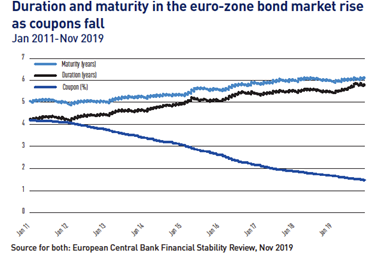A major international financial stability report shows that shadow banking slowed in 2018, and reveals pension funds as the fastest-growing extenders of credit in that year.
In its Global Monitoring Report on Non-Bank Financial Intermediation 2019 published today, the Financial Stability Board (FSB) said non-bank financial intermediation (NBFI) – previously called shadow banking – grew by just 1.7% to $50.9trn (€45.9trn) in 2018, according to the board’s narrow measure.
The measure includes non-bank financial institutions doing credit business seen as possibly posing bank-like financial stability risks.
The FSB’s annual monitoring exercise is designed to assess global trends and risks from NBFI, and part of its efforts to boost the sector’s resilience.
The 1.7% growth is significantly slower than the sector’s 2012-17 average annual growth rate of 8.5%, according to the report, which says NBFI now makes up 13.6% of total global financial assets.
In addition, the FSB reported that collective investment vehicles with features that make them susceptible to runs – a group whose assets make 72% of the narrow measure – grew by 0.4% in 2018, much slower than the group’s average annual growth rate over the previous five years of 11%.
Klaas Knot, chair of the FSB Standing Committee on Assessment of Vulnerabilities, said: “Non-banks play an increasingly important role in the global financial system.”
He said the FSB’s monitoring report provided a significant resource for authorities to assess trends and risks from NBFI.
“Such information is essential for a forward-looking, system-wide oversight framework,” he said.
The detailed and comprehensive set of international data has been produced at a time when macroprudential authorities such as the International Monetary Fund, the European Central Bank and the Bank of England, have been arguing that asset management activities are becoming systemically more risky.
The report also makes clear that lending activities by pension funds are now growing faster than those of banks and any other category of credit supplier.
In 2018, pension fund credit assets increased by 7.1% – significantly faster than the 3.9% growth rate seen in 2017, according to the FSB’s report.
“This growth was primarily driven by the US, but credit assets in India (33.3%), Hong Kong (15.5%) and Korea (12.6%) also grew at a high rate,” the board reported.
By comparison, banks’ credit and lending increased by 5% in 2018, while that of insurance companies rose by 1.5% and OFIs (other financial institutions) saw their lending rise by 5.7%.
However, banks still hold the vast majority of total credit assets, including deposits, with $114.5trn of the total $185.9tn, and among the four categories, pension funds are the category with the smallest amount at $8.8trn at the end of 2018.
The FSB’s global report covers data from 29 jurisdictions representing more than 80% of global GDP.












